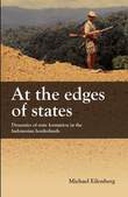Explore

Set in West Kalimantan, Indonesian Borneo, this study explores the shifting relationships between border communities and the state along the political border with East Malaysia. The book rests on the premises that remote border regions offer an exciting study arena that can tell us important things about how marginal citizens relate to their nation-state. The basic assumption is that central state authority in the Indonesian borderlands has never been absolute, but waxes and wanes, and state rules and laws are always up for local interpretation and negotiation. In its role as key symbol of state sovereignty, the borderland has become a place were central state authorities are often most eager to govern and exercise power. But as illustrated, the borderland is also a place were state authority is most likely to be challenged, questioned and manipulated as border communities often have multiple loyalties that transcend state borders and contradict imaginations of the state as guardians of national sovereignty and citizenship. (...)Michael Eilenberg (1975) is Assistant Professor of Anthropology at Aarhus University. His research focuses on issues of state formation, sovereignty, and agrarian expansion in frontier regions of Southeast Asia.(...)“Eilenberg’s rich insights could not have been achieved without years spent developing trust and experiencing firsthand the ambiguity of a border as a zone of opportunity as well as control. The analysis of the border elite who combine traditional authority with bureaucratic once, charisma with force, and legal practices with illegal ones throws into sharp relief a set of practices that are found not only on the fringes of the Indonesian nation, but on the fringes of its cities as well. Anyone interested in understanding how power works in Indonesia should read this book”.Tania Murray Li, Toronto University(...)“This pioneering study of state formation ‘at the margins’ forms a perfect demonstration of the promise of borderland studies. Eilenberg argues convincingly that borderlands – and the international borders that run through them – are critical sites for understanding shifting state-society relations. His book provides a powerful analysis of the local historical contexts of resource struggles, state policies and social strategies in what many consider to be a remote and insignifcant Indonesian borderland. Eilenberg makes us realize how the unpredictable dynamics of such borderland societies affect entire nation-states”.Willem van Schendel, Amsterdam University
This book is included in DOAB.
Why read this book? Have your say.
You must be logged in to comment.
Rights Information
Are you the author or publisher of this work? If so, you can claim it as yours by registering as an Unglue.it rights holder.Downloads
This work has been downloaded 321 times via unglue.it ebook links.
- 176 - pdf (CC BY-NC-ND) at OAPEN Library.
Keywords
- borderland studies
- Dutch language
- Iban people
- Indonesia
- Kalimantan
- local politics
- lumber
- Malaysia
- Sarawak
- Society & Social Sciences
- thema EDItEUR::J Society and Social Sciences
- West Kalimantan
Links
DOI: 10.26530/OAPEN_411390Editions

